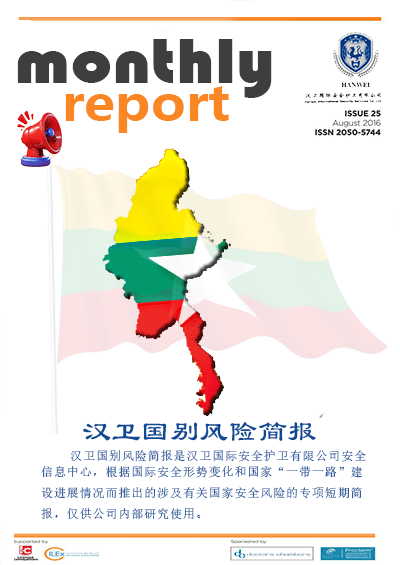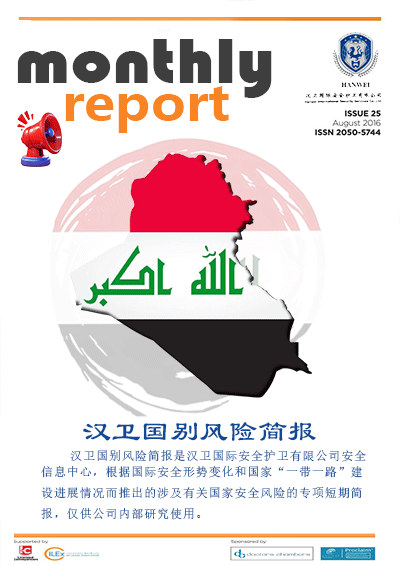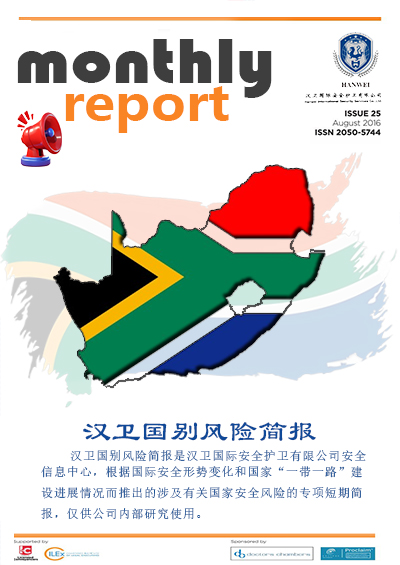Analysis of the Social Security Situation in Nigeria in May 2025
Researcher No. 007
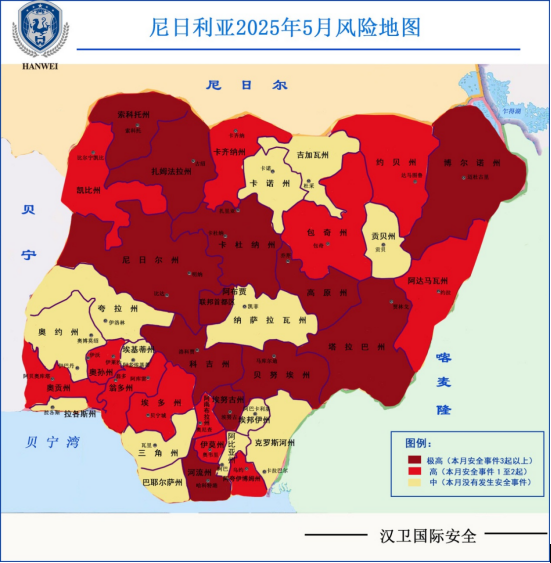
According to the monitoring report of the Security Officer of Hanwei International stationed in West Africa and comprehensive media reports, a total of 68 security incidents occurred in Nigeria in May 2025. A total of 520 civilians and 40 military and police personnel were killed in various security incidents, and at least 89 people were kidnapped. The types of security incidents mainly include armed attacks and kidnappings, military clearance operations and public security accidents, etc. Compared with last month, the number of security incidents decreased by 12, the death toll increased by 121, and the number of kidnappings decreased by 135. Analysis suggests that the security situation in Nigeria remains unstable this month. Large-scale armed attacks and kidnappings continue to occur in the central and northeastern regions, causing significant casualties. Meanwhile, floods broke out in the central and northern parts of this month, causing over 200 deaths and submerging a large number of residential houses. Facing the severe security situation, Nigerian President Bora Tinubu held an emergency high-level security meeting on May 16 to conduct a comprehensive assessment of the current security situation, plan to adjust military operation strategies, strengthen cross-departmental collaboration, and effectively curb the spread of security threats. The Chinese Embassy in Nepal and other institutions have repeatedly reminded enterprises and individuals in Nepal to avoid traveling to areas with a high incidence of armed attacks such as the central and western regions and the northeastern region in the near future, minimize going out, and do their utmost to ensure the safety of life and property. This month, the security risks in central, north-central and northeastern Nigeria are extremely high, while those in other regions are at a medium to high level.
I. Comprehensive Analysis of Security Incidents
Among the 68 security incidents that occurred in Nigeria in May, 34 were armed attacks, accounting for 50% of the total. There were 18 cases of armed kidnapping, accounting for 26%. There were 8 public safety incidents, accounting for 11%. There was one armed conflict among nomads, accounting for 1%. There were 7 military clearance operations, accounting for 10%. A total of 621 people were killed and at least 89 were kidnapped in various incidents. Among the deceased, there were 556 civilians, 40 military and police personnel, and 61 terrorists were killed.
The overall security situation presents the following characteristics:
(1) The security risks in the central and northeastern regions are extremely high.In May, security incidents in Nigeria were mainly concentrated in Benue State and Plateau State in the central part and Borno State in the northeastern part. Meanwhile, the central and western states of Zamfarah, Kaduna and Niger, as well as the central capital Abuja, are also high-risk areas. Among them, the central Benue state has the highest security risk, with a total of 9 security incidents, resulting in 54 deaths and 1 person being kidnapped. Last month, there were as many as 13 armed attacks and kidnappings in this state. Although the number has decreased this month, it remains the most dangerous area. Seven security incidents occurred in Borno State in the northeast, the same as last month. They were mainly armed attacks and kidnappings, resulting in 77 deaths and 18 kidnappings. Six security incidents occurred in the central Plateau State, mainly armed attacks and kidnappings, resulting in 30 deaths and 5 kidnappings. Media reports say that armed attacks and kidnappings in Plateau State over the past two months have caused huge losses to the local area. In addition to casualties, the economic losses of herdsmen reached as high as 300 million naira (approximately 1.7 million yuan). In addition, on May 20th, the Safety Operations Office of the Nigeria-China Chamber of Commerce and the Safety Operations Committee of the Nigeria-China Mining Association jointly issued a safety warning, stating that there were safety hazards in some areas of Zamfarah State, Kebi State and Kaduna State in Nigeria recently. The bandit gang planned to carry out kidnappings of foreign citizens in areas such as Anka, Gwashi, Dan Gulbi and Bingi in Zamfarah State, Wazagou and Ranko in Kebi State, and Birnin Gwari and Muya in Kaduna State. It is called on that Chinese-funded enterprises and Chinese citizens in the above-mentioned areas must be highly vigilant and minimize their outdoor activities to the greatest extent. At the same time, personnel engaged in fieldwork are required to evacuate to cities promptly or leave the above-mentioned risk states as soon as possible to fully ensure the safety of lives and property.
Figure 1: Distribution Diagram of Security Incidents in May
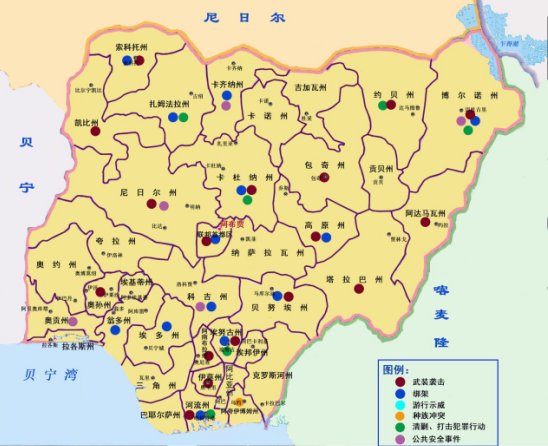
Chart 1: Statistics of Security Incidents in Major Regions in May
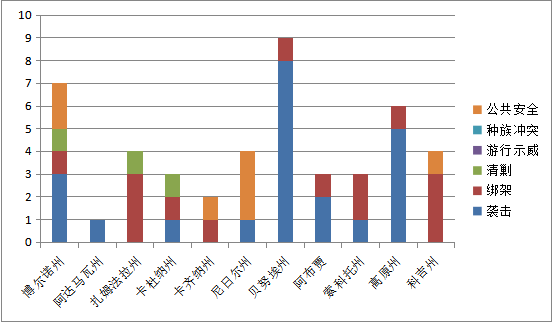
(2) Armed attacks and kidnappings continue to occur frequently.In May, a total of 52 armed attacks and kidnappings occurred in Nigeria, resulting in 351 deaths and at least 89 kidnappings. This month, armed attacks and kidnappings in Nigeria have shown the following characteristics: (1) Military camps and checkpoints have become key targets. According to statistics, a total of 10 attacks on military camps and checkpoints occurred this month, resulting in the deaths of 40 military and police personnel. On the afternoon of May 1st, suspected members of the Bivra Indigenous organization attacked a police checkpoint along the Agbo-Ogugu Highway in the Agbogugu community under the Awgu local government jurisdiction of Enugu State, resulting in the deaths of three police officers and the burning of two police cars. On May 3rd, Boko Haram terrorists launched an attack on the base of the 27th Task Force of the Nigerian Army in Bunadi, a local government area of Gujabba, Yobe State, resulting in at least four soldiers' deaths and the destruction of multiple combat equipment. On May 13th and 14th, militants from Boko Haram and the Islamic State West Africa Province (ISWAP) successively attacked four military bases in the northeastern Borno State, resulting in the deaths of four soldiers and the disappearance of many others. On May 26th, a suspected attempted suicide attack occurred near the Mogadishu barracks in Abuja, the capital of Nigeria. An attacker attempted to break into a military camp to carry out an attack and was shot dead on the spot by military personnel. The incident left one passer-by injured. (2) Road kidnapping cases occur frequently. Seven highway kidnappings occurred this month, causing significant casualties. Late at night on May 3rd, suspected Fulani armed herders attacked a commercial bus along the Otukpo-Adoka highway in Benue State, resulting in the death of one driver and the kidnapping of four passengers. On May 4th, two buses carrying 33 passengers in Kogi State were forcibly intercepted by armed men when passing through the Gada Biyu area, and all the passengers were kidnapped. On May 6th, an 18-seat bus in Koji State was forced to stop on the Itobei Ochadamu Road in the Koji East Senate District, and the passengers on board were kidnapped. On the afternoon of May 6th, armed pirates attacked a passenger ship in the Isaka River Basin under the jurisdiction of the Okrika local government in Rivers State, kidnapping 14 crew members. On the early morning of May 8th, armed men intercepted passing vehicles on the Okigwe-Owerri Highway in the Okigwe local government jurisdiction of Imo State, resulting in 30 deaths and multiple cars being burned. On that day, the armed men were divided into three groups, set up roadblocks on the road, fired into the sky to cause panic and chaos, and waited for an opportunity to carry out the kidnapping. (3) Boko Haram launched attacks using drones. This month, Boko Haram terrorists used drones to attack farmers who were gathering firewood in Borno State, resulting in 10 deaths and 5 people missing.
(3) Incidents related to China.In May, two incidents involving China occurred in Nigeria, both related to illegal mining. Two Chinese people were arrested for illegal mining. On May 9th, the Ikoi Branch of the Economic and Financial Crimes Commission (EFCC) in Lagos, Nigeria, launched a surprise operation to dismantle an illegal mining gang in the Ojare area of Ogun State. A total of eight people were arrested, including two Chinese suspects. The EFCC pointed out that samples of suspected low-grade lithium ore were found in the seized items, indicating that the gang is suspected of illegally mining strategic mineral resources in Nigeria. At present, all the suspects have been detained and the case is under further investigation. Four Chinese people were sentenced to five years in prison for illegal mining. These four people were arrested in March this year for illegal mining. On May 15th, the Federal High Court of Jos City, Plateau State, Nigeria, made a judgment on this case. Four Chinese citizens have been sentenced to five years in prison or fined one million naira (about 4,000 yuan or more) for violating multiple laws including the Law on Miscellaneous Crimes. At the same time, they were deported and the involved assets of approximately 134 million naira (about 540,000 yuan) were confiscated.
(4) Major casualties are caused by public safety incidents such as floods.In May, Nigeria witnessed four major traffic accidents, one oil pipeline explosion, one capsized ship and flood disasters, resulting in a total of 209 deaths. On May 28th, two communities in Niger State were hit by floods, which have caused 200 deaths, many people missing and over 50 houses submerged by floodwaters. This month, the Lassa fever epidemic remains highly prevalent in Nigeria. On May 19th, the Nigerian Center for Disease Control and Prevention (NCDC) released the latest report showing that as of May 11, 2025, a total of 93 local governments in 18 states of Nigeria have reported 4,963 suspected cases of Lassa fever, 720 confirmed cases and 140 deaths, with a fatality rate of 19.4%. It is 18.1% higher than the same period in 2024. Compared with last month, the number of suspected cases increased by 451, confirmed cases increased by 24, and the number of deaths increased by 8. At present, the epidemic situation is most severe in Ondo State, Baochi State and Talaba State. In addition, on May 3rd, the Nigerian Centre for Disease Control and Prevention (NCDC) issued a public health warning regarding a significant increase in cholera cases in 30 local government regions (LGAs) across nine states. The notice said that as of early May, 1,141 suspected cases of cholera had been reported across the country, resulting in 30 deaths. The cases were mainly concentrated in Bayelsa, Lagos, Abia and Zamfarah states.
(V) Continuously carry out military campaigns to clear and crack down on illegal and criminal activities.In May, Nigerian security forces and police continued to carry out military clearance operations in the central and southern, central and western, and northeastern regions, and cracked down on illegal and criminal activities in the central and other areas. From May 1st to 3rd, the Nigerian military launched a large-scale anti-terrorism crackdown operation in many areas in the north, and a large number of terrorists were killed. On May 4th, the "Operation Hardingkai" forces of the Nigerian military launched a surprise attack on two gas stations in Maiduguri, Borno State, seizing 500 barrels of fuel used to support the activities of the Boko Haram terrorist organization and arresting several suspects. On May 14th, the Nigerian Navy launched a crackdown on crude oil theft and illegal oil refining in the Niger Delta region, dismantling nine illegal oil refineries and destroying a large amount of stolen oil products. On May 20th, the Nigerian police successfully rescued 28 kidnapped people in Enugu State, arrested 10 suspects, and seized a batch of firearms, ammunition, cash, vehicles and other items. On May 31, the Nigerian military stated that the military operation codenamed "Hadinkai" had achieved significant results. The operation force precisely targeted the terrorist stronghold in the Bita area of Borno State, killing at least 60 militants.
Chart 2: Comparison of Security Incident Classifications in May
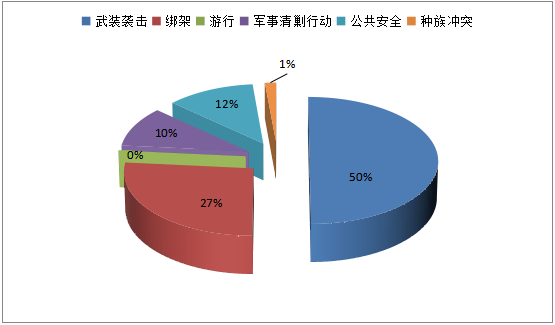
Chart 3: Classification Statistics of Deaths in May
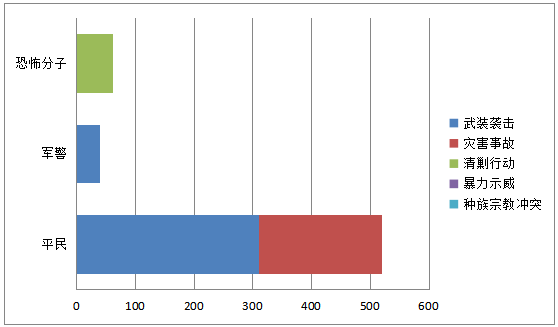
Chart 4: Comparison of the Number of Major Security Incidents in May and April
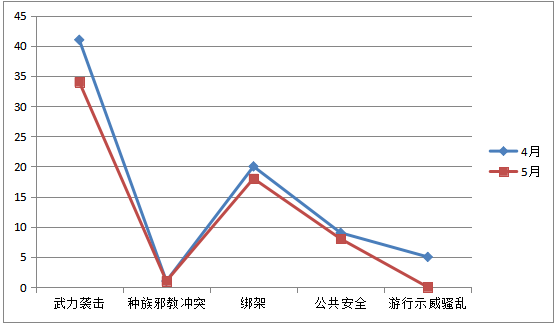
Ii. Risk Early Warning and Prevention Suggestions
Chart 5: Recent social Security Risk Warnings in Asia on the 5th
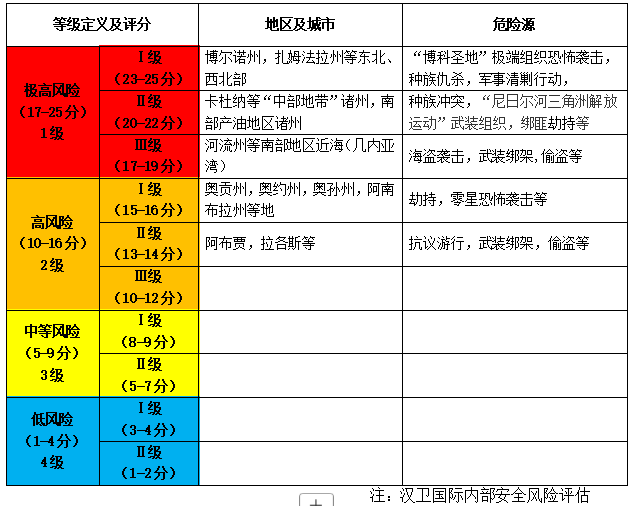
Given the complex social environment and high-risk security assessment in Nigeria, the following security measures are recommended:
The first is to provide full-time security services during travel.In remote rural areas of Nigeria, the police force is limited and the road infrastructure is poor. As a result, the response of security forces to violent crimes and riots and conflicts is often seriously delayed. Therefore, Chinese-funded enterprises and others should promptly obtain the latest local security intelligence, conduct specific security assessments of the travel destinations, and have security personnel accompany and protect them.
Second, pay attention to flood prevention during the rainy season.This month, floods occurred in two communities in Niger State, Nigeria, causing 200 deaths. The government of Nasarava State has also issued a flood warning, reminding residents of flood-prone communities to move to higher ground to avoid casualties during the rainy season. For this reason, it is reminded that Chinese enterprises and personnel stationed in Nepal must be highly vigilant and enhance safety precautions. (1) Keep an eye on the disaster situation. Check the early warning information released by the local government and meteorological department in a timely manner to avoid going to high-risk areas for floods. (2) Be well-prepared for emergencies. Check the drainage, power supply and material reserves at the base, formulate an evacuation plan in advance and ensure the smooth operation of communication equipment. (3) Travel with caution. Avoid wading through water and stay away from rivers and low-lying areas. Check the road conditions before setting out to prevent secondary disasters. (4) Mutual assistance and linkage. Strengthen personnel management, improve the emergency liaison mechanism, and contact the embassy or local rescue department immediately in case of emergency.
The third is to effectively avoid risks.Most of the attacks in Nigeria occurred in the northeastern and central-northern parts, especially in Maiduguri in the central part of Borno State, the roads connecting other major towns, the areas bordering Niger, and Zamfarah State. Recently, security incidents have occurred frequently in Kaduna State and Abuja. In the event of a terrorist attack, one should follow the official instructions and get in touch with their specific security service provider to receive timely assistance. Video surveillance is installed at the base, shops, warehouses and residences, and facilities such as trenches, high walls, barbed wire, anti-collision barriers, buffer zones and alarm systems are set up in the camps to strengthen military and police security forces and expand the defense range. At the same time, it is necessary to avoid lingering near areas that may become targets of armed attacks, including government and security force facilities, landmark buildings and religious sites, etc. In Nigeria, it is particularly important to minimize stays in densely populated public places such as the northeastern region, religious festival sites, areas where ethnic groups live together, regions with a high incidence of crime (especially highways and areas where piracy is active in the Gulf of Guinea), oil and gas facilities, government and military camp facilities, diplomatic embassies, religious worship places, schools, markets, refugee camps, bus hubs, and surrounding areas Time.

